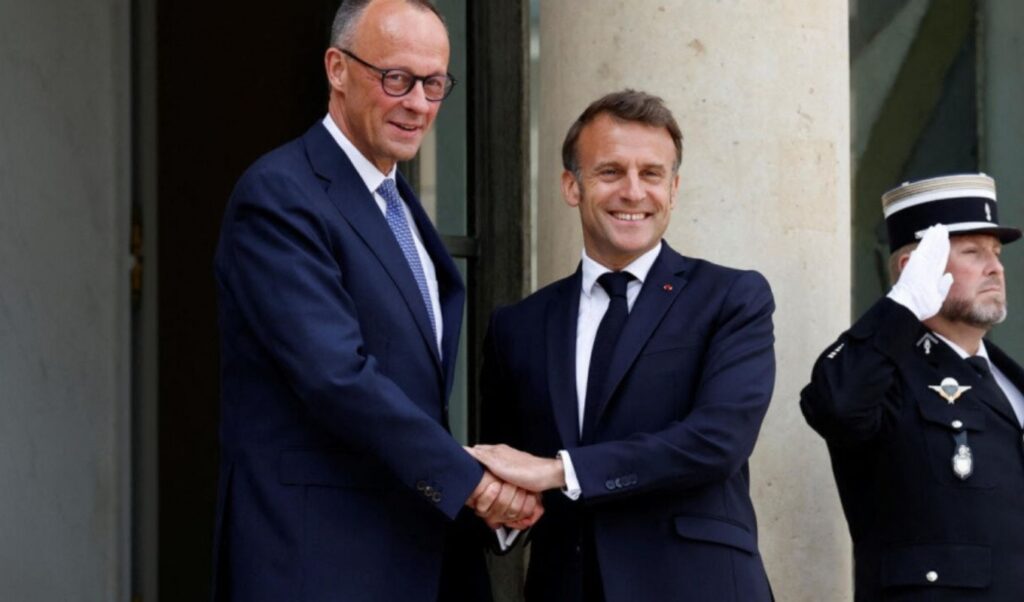Bloomberg reveals the behind-the-scenes dynamics that led to the trade agreement announcement between the European Union and the United States, exposing the stance taken by France and Germany. According to the report, although the European Commission formally handles trade matters, the agreement reached between Ursula von der Leyen and Donald Trump, which imposes 15% tariffs on most European imports, was essentially designed by national governments that constrained the negotiators. Sources speaking to the agency emphasized that for many officials, the agreement was considered “the least bad solution” that could be found for the EU.
The most significant disadvantage faced by EU negotiators throughout the talks was that national governments – particularly Germany and France – were not prepared to risk economic costs in order to challenge Trump to make concessions. Von der Leyen herself did little to resist and quickly retreated from the EU’s original goal of pursuing a mutually beneficial and balanced agreement, the report emphasizes.
“Ultimately the EU is weak”
According to Bloomberg sources, EU envoys were informed a week ago that they essentially had two choices: accept the 15% tariffs Trump proposed or retaliate. But ambassadors were warned that for the bloc to counter-attack effectively, it would need to be prepared to remain united and ready to bear the costs. It was neither.
Ultimately, the EU is weak, one source stated, because it is neither united nor strategic in a world where power matters.
On Sunday, German Chancellor Friedrich Merz welcomed the agreement with the US, saying that EU member unity had paid off. French Trade Minister Laurent Saint-Martin said Monday that EU officials should return to the negotiating table soon to try to improve the agreement’s terms.
“I don’t want to stop at what happened yesterday,” he told France Inter radio. “That would be like accepting that Europe is not an economic power.”
Why France and Germany pushed
Throughout negotiations with the US, European capitals consistently focused on defending their national interests rather than forging a strong European position and sought solutions that would minimize short-term damage risks to their key industries, Bloomberg’s report states.
This is partly due to political weaknesses in Germany and France, where both Merz and Macron face threats from right-wing populists ready to exploit any economic blow, as well as concerns about their dependence on the US for security and fears that Trump might react to trade pressures by reducing support for Ukraine.
According to the report, throughout negotiations, while key governments showed their “teeth,” behind the scenes they sought ways to appease the US. Notably, the report reveals that France pushed for activating the EU’s anti-coercion instrument — a broad-scale mechanism that would allow the bloc to target American technology companies and services — while Germany insisted all options remained open. However, behind the scenes, their demands weakened the EU’s negotiating position.
Also, from two lists of American products worth approximately $100 billion on which the EU was considering imposing countermeasures, in April, the Commission, after pressure from member states, agreed to freeze one. Some believed this moderate approach would bring better results, while others thought the EU was weakening its position.
But this isn’t happening for the first time. As Bloomberg recalls, even during the Biden administration, the EU withdrew all its countermeasures while the US maintained some of its tariffs. According to sources, warnings from certain officials within the Commission’s trade team were ignored.
This time, Commission officials faced a barrage of requests from member states to remove products from the list of goods that would be targeted with retaliation. France, for example, wanted American spirits excluded, fearing Trump would respond with tariffs on champagne and wine.
From Germany, Merz repeatedly sought a quick and simple agreement, without clearly defining what this meant, while privately complaining that EU officials were getting stuck on details.
Protecting the German automotive industry was at the center of Berlin’s demands. A plan drafted by the industry and promoted by German officials envisaged companies receiving tariff relief in exchange for investments in the US. According to Bloomberg, such a mechanism risked transferring European jobs and investments to the US.
The EU also faced intense lobbying against potential retaliation from companies wanting an agreement by this month’s deadline, according to sources. Before Sunday’s meeting, Paris reminded the Commission not to retreat from its “red lines,” which included restricting market access for many agricultural products and maintaining regulatory autonomy. At the same time, however, French officials pressured von der Leyen’s team to secure a good deal for their wine industry




